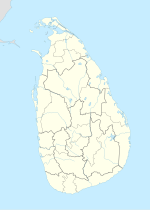| Battle of Gannoruwa | |||||||
|---|---|---|---|---|---|---|---|
| Part of Sinhalese–Portuguese War | |||||||
| |||||||
| Belligerents | |||||||
| Sinhalese king's army | Portuguese army | ||||||
| Commanders and leaders | |||||||
|
Rajasinghe II Wijayapala |
Diogo de Melo de Castro † Fernão de Mendonça Furtado | ||||||
| Strength | |||||||
| Nearly 70,000 (According to Sinhalese book Mandaram puwatha) |
1,000 Portuguese 5,000 mercenaries | ||||||
| Casualties and losses | |||||||
| Unknown | 4,000 (approximately) | ||||||
Location of Gannoruwa | |||||||
The Battle of Gannoruwa was a battle of the Sinhalese–Portuguese War fought in 1638 between the occupying Portuguese forces and the Sinhalese King's army at Gannoruwa in the District of Kandy, Sri Lanka. The Portuguese had attempted three times without success to capture the Kingdom of Kandy, in order to bring the entire island under their rule. In 1635, Rajasinghe II became the king of Kandy and started negotiations with the Dutch to obtain their help in driving out the Portuguese. The Portuguese hastened their efforts to take Kandy because of this, and Diogo de Melo de Castro, the Portuguese Captain General, tried to provoke the Sinhalese on several occasions.
Melo seized an elephant presented to a merchant by the king, to which the king responded by seizing two of Melo's own horses. Following this incident, Melo assembled his troops and set out for Kandy. The city of Kandy was evacuated by the Sinhalese, and Melo's army found the city empty when they arrived. They sacked and burned the city, and started to return to Colombo. However, their way forward was blocked by the Sinhalese army at Gannoruwa. The Portuguese force was surrounded with all escape routes cut off.
On 28 March 1638, the Sinhalese army attacked the Portuguese force, leaving only 33 Portuguese soldiers alive, along with a number of mercenaries. The heads of the killed Portuguese soldiers were piled before the Sinhalese king Rajasingha II. The battle, which ended in victory for the Sinhalese army, was the last battle fought between the Portuguese and the Sinhalese, and was also the final battle fought by the Kingdom of Kandy. The Portuguese were driven out of the country by the Dutch soon afterwards.
